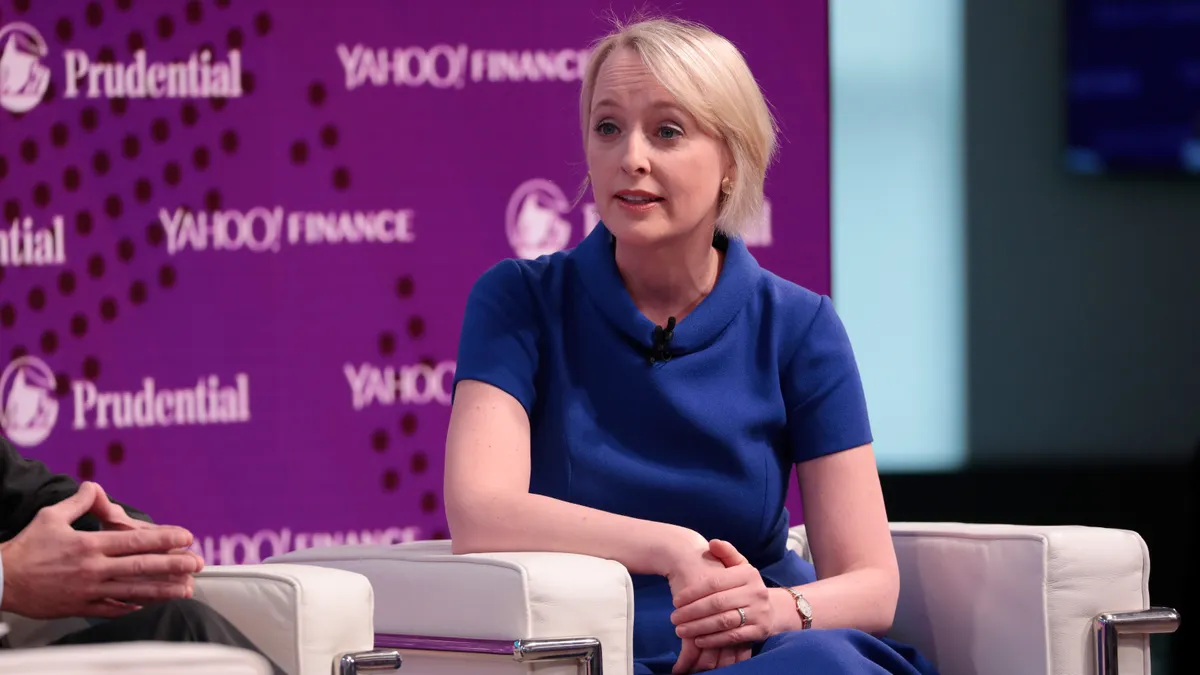Law firm Husch Blackwell has launched “HB In-House,” a training program to prepare its lawyers for transitioning into in-house legal roles. The initiative is aimed at providing career development opportunities and enhancing client service.
The course provides information on what it means to be in-house counsel, Joe Glynias, Husch Blackwell’s chair, told Legal Dive. “There is nothing like this in the marketplace right now,” said Angela Quinn, the firm’s chief client officer.
In-house legal departments have been the fastest-growing sector of the legal profession for a number of years, and yet law schools have struggled to prepare people for those roles, said David B. Wilkins, a Harvard Law School professor and faculty director for the law school’s Center on the Legal Profession.
Wilkins, who has taught a class on the challenges of being a general counsel for several years, called the Husch Blackwell program a “smart move.”
Summer school
The four-month program, which begins this month and runs through September, provides attorneys an in-depth look at the responsibilities and operations of in-house legal departments. The class is composed of 25 Husch Blackwell attorneys.
Glynias said about four times that number applied for a spot in the inaugural class. The first class is available only to attorneys at the law firm but future offerings will be opened to clients.
Participants must have a couple of years with the firm. The class is composed of Level 2 associates, senior “of counsel” and partners – anyone that has advanced beyond a Level 1 associate. The curriculum was designed in collaboration with over 25 of the firm's clients, who will serve as instructors, coaches and mentors.
The course is designed to provide attorneys with an inside view of their clients’ roles and responsibilities, and for those attorneys interested in moving in-house, provide them with the tools necessary for a successful transition to an in-house position.
The sessions involve six core areas: legal operations, understanding the business, leading by influence, financial acumen, relationship building and risk management. Course formats include e-learning, small group discussions and individual mentoring.
Attorneys who want to further pursue an in-house role will be able to select temporary assignments after they finish the course, Glynias said. The law firm funds the program, which is free to attorneys.
In-house ambition
Glynias said he noticed that associates often kept their in-house ambitions to themselves until they’d accepted a new role. He said he felt bad that attorneys didn’t feel comfortable coming to him for advice on making the move. “Because working as outside counsel with lots of clients all the time, you do get insights into these different environments and what they're like,” he said.
Husch Blackwell was among the top five law firms in the country supplying candidates for general counsel or chief legal officer roles, according to a study conducted by law firm intelligence company Firm Prospects. From February 2017 through May 2021, the firm placed 17 former colleagues as general counsel.
More than 40 of its alumni are working in-house somewhere, Glynias said. “It’s blind not to see that people would be pursuing this path,” he said.
The firm recognizes that not everyone wants the traditional partner track, Quinn said.
Wilkins said he’s been urging law firms for years to talk to their associates about leaving “the day they arrived.” Many of his students view law firms as a stepping stone, which doesn’t mean that some won’t stay with the firm. “But if you talk to them about it, they're much more likely to stay longer and leave happier, which is better for the law firm,” Wilkins said.
In addition, Glynias said, clients would reach out to him to ask about attorneys who would be a good fit for in-house jobs.
“It’s a healthy way to develop professionals,” Glynias said. “By teaching our lawyers about corporate legal departments' needs and developing their skills, we'll ensure a smooth transition and enable them to make an immediate impact.”
Accounting model
While innovative for a law firm, such a move isn’t new, Glynias said: Big accounting firms have prepared their professionals for in-house work for years, he said.
Wilkins noted that many professional service organizations, such as consulting and accounting firms, have a highly developed alumni network. “And so,” he said, “in some sense, you could look at this as an opportunity for law firms to try to catch up.”
Law firm benefit
One immediate effect of the program is that the data it provides to the firm can be useful in meeting client’s needs.
Glynias said that while putting the program together, it soon became clear that the information provided by the clients puts the firm in a position to provide better service as outside counsel. He said all of the attorneys at the firm should possess such insight regardless of whether they pursue an in-house counsel role or remain outside counsel.
There are a number of ways in which people are trying to understand how to deal in the new marketplace. Competition is stiff for both clients and talent. The firm can market this to top law graduates, Wilkins said. As for clients, they can say, “Help us with this and we will give you better lawyers,” he said. “It’s a smart way of cementing the bonds between Husch Blackwell and its own clients.”
A recent survey by legal talent provider Axiom found that almost 90% of in-house counsel aren’t happy with their jobs. Glynias said the program will provide attorneys with the opportunity to test drive a career as in-house counsel and determine whether making such a move might work well for them.


















